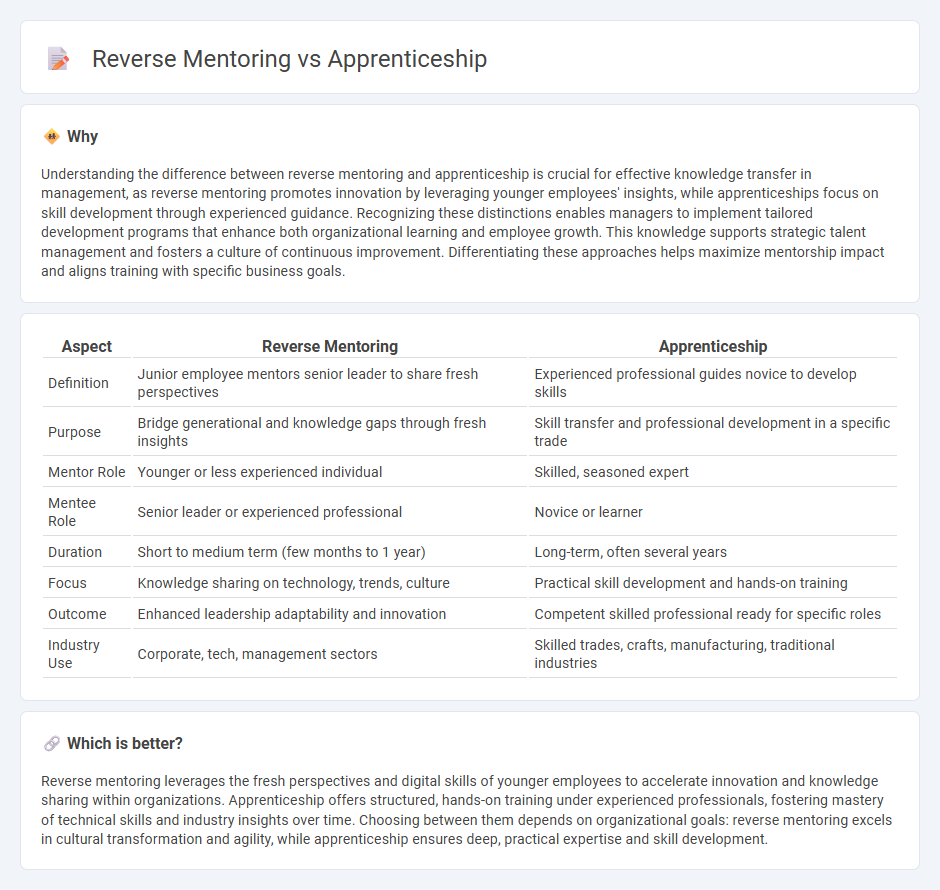
Reverse mentoring fosters knowledge exchange by pairing junior employees with senior leaders, cultivating innovation and fresh perspectives in management practices. Traditional apprenticeship emphasizes hands-on learning and skill development through guided experience with seasoned professionals. Explore the distinct benefits and applications of reverse mentoring and apprenticeship in modern management strategies.
Why it is important
Understanding the difference between reverse mentoring and apprenticeship is crucial for effective knowledge transfer in management, as reverse mentoring promotes innovation by leveraging younger employees' insights, while apprenticeships focus on skill development through experienced guidance. Recognizing these distinctions enables managers to implement tailored development programs that enhance both organizational learning and employee growth. This knowledge supports strategic talent management and fosters a culture of continuous improvement. Differentiating these approaches helps maximize mentorship impact and aligns training with specific business goals.
Comparison Table
| Aspect | Reverse Mentoring | Apprenticeship |
|---|---|---|
| Definition | Junior employee mentors senior leader to share fresh perspectives | Experienced professional guides novice to develop skills |
| Purpose | Bridge generational and knowledge gaps through fresh insights | Skill transfer and professional development in a specific trade |
| Mentor Role | Younger or less experienced individual | Skilled, seasoned expert |
| Mentee Role | Senior leader or experienced professional | Novice or learner |
| Duration | Short to medium term (few months to 1 year) | Long-term, often several years |
| Focus | Knowledge sharing on technology, trends, culture | Practical skill development and hands-on training |
| Outcome | Enhanced leadership adaptability and innovation | Competent skilled professional ready for specific roles |
| Industry Use | Corporate, tech, management sectors | Skilled trades, crafts, manufacturing, traditional industries |
Which is better?
Reverse mentoring leverages the fresh perspectives and digital skills of younger employees to accelerate innovation and knowledge sharing within organizations. Apprenticeship offers structured, hands-on training under experienced professionals, fostering mastery of technical skills and industry insights over time. Choosing between them depends on organizational goals: reverse mentoring excels in cultural transformation and agility, while apprenticeship ensures deep, practical expertise and skill development.
Connection
Reverse mentoring and apprenticeship both facilitate knowledge transfer by pairing less experienced employees with seasoned professionals, fostering mutual growth and skill development. Reverse mentoring emphasizes the sharing of digital expertise and fresh perspectives from younger employees to senior leaders, while apprenticeship traditionally involves hands-on training and practical experience under expert guidance. Together, they create a dynamic learning environment that enhances organizational learning and talent retention.
Key Terms
Skill Transfer
Apprenticeship emphasizes the transfer of technical skills and industry knowledge from an experienced mentor to a less experienced apprentice, fostering hands-on learning and practical application. Reverse mentoring flips this dynamic by enabling younger or less experienced employees to share digital skills, fresh perspectives, and innovative approaches with senior leaders, enhancing organizational agility. Explore more to understand how these mentoring models can optimize skill development within your organization.
Knowledge Exchange
Apprenticeship facilitates knowledge exchange by allowing experienced professionals to impart practical skills and industry insights to newcomers, fostering hands-on learning and skill development. Reverse mentoring enhances this dynamic by enabling younger employees or those with different expertise, such as digital skills, to share fresh perspectives and technological know-how with senior staff. Explore how these complementary approaches can transform organizational learning and innovation.
Generational Learning
Apprenticeship emphasizes knowledge transfer from experienced professionals to newer generations, fostering skill development through hands-on guidance. Reverse mentoring flips this dynamic by enabling younger employees to share digital expertise and fresh perspectives with senior leaders, enhancing cross-generational collaboration. Explore the transformative impact of generational learning by delving deeper into apprenticeship and reverse mentoring strategies.
Source and External Links
Apprenticeship for Career Seekers - Apprenticeship Colorado - Offers a path to a well-paying job with hands-on experience while earning a salary and learning new skills.
Apprenticeship Jobs in El Paso, TX - Provides a variety of paid apprenticeship opportunities in different fields, with hourly wages ranging from $13 to $50.
Apprenticeship.gov - Connects career seekers, employers, and educators with resources for apprenticeships across multiple industries.
 dowidth.com
dowidth.com